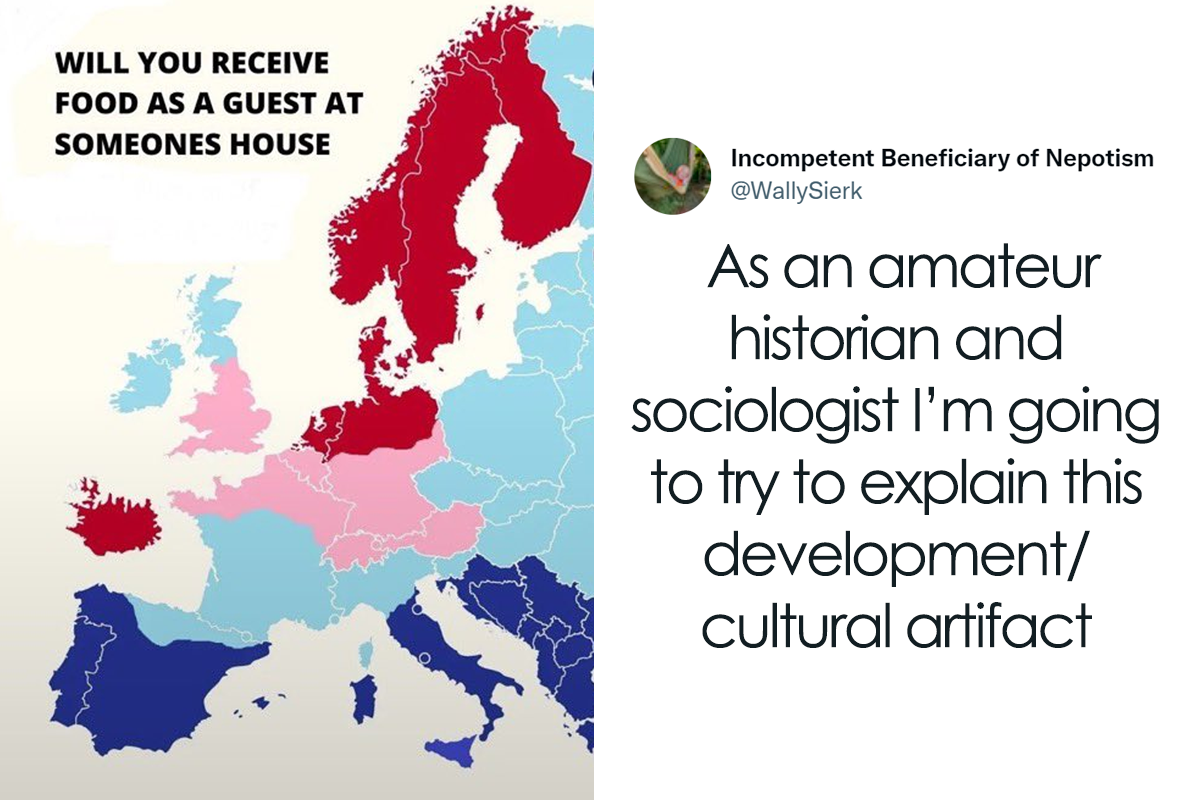
“This Is Blowing People’s Minds”: Amateur Historian Explains Why Some European Countries Probably Won’t Feed You In Their Home
Sweden is a unique country. Famous for its incredibly long summer days, mass output of pop music and high standard of living, the nation is usually seen in a positive light online. Recently, it’s made the news for introducing “sexy trashcans” and applying to join NATO. However, about 3 weeks ago, the internet was abuzz after someone shared on Reddit that when they would visit their Swedish friend’s house as a kid, they would have to wait in the friend’s bedroom while the Swedish family ate any meals. The guest was never even offered food. The internet went wild discussing how bizarre they found this behavior, and some Swedes confirmed that their childhood experiences were similar. Bored Panda even published a piece last week featuring reactions to this Swedish quirk that you can read right here.
To help get to the bottom of this cultural phenomenon, Twitter User Wally Sierk posted a thread two weeks ago explaining why some countries are less likely to feed their guests than others. Below, you can read Wally’s explanation, as well as some of the responses it has received. Then we’d love to hear in the comments how you feel about all of this; is it common in your country to feed guests? Or do you follow the Swedish model of “please, wait in the bedroom until we’re finished”?
After the internet went crazy about Swedes not feeding their kids’ guests, one amateur historian and sociologist took to Twitter to explain why some countries are less likely to offer their guests food
Image credits: WallySierk
Image credits: WallySierk
Image credits: WallySierk
Image credits: WallySierk
Image credits: WallySierk
Image credits: WallySierk
Image credits: WallySierk
He explained that it can be traced back to the Protestant church attempting to minimize societal conflicts by making sure nobody owed anyone anything, so people cut down on hospitality
Image credits: WallySierk
Image credits: WallySierk
Image credits: WallySierk
Image credits: WallySierk
Image credits: WallySierk
It’s interesting to learn that in some countries, giving others less was a solution to violence in society. Each culture has its own quirks, and apparently Scandinavia is not known for being particularly hospitable or friendly. According to InterNation’s 2017 Expat Survey, when it comes to the places where it’s easiest for expats to find friends, out of 65 countries, Norway, Denmark and Sweden all came in at the very bottom of the list. Finland didn’t do much better either, at the 57th slot. In terms of friendliness in the same 65 nations, Finland, Norway, Sweden and Denmark all ranked in the bottom 16 spots as well. Similarly, all of these countries fell in the bottom 20 spots when ranking places where expats feel most welcome.
On the contrary, Portugal was ranked the number one country where expats feel welcome, with Spain close behind at number six. Both of these countries were listed as places guests will “almost always” be given food on the map shared by Wally Sierk on Twitter. Portugal was also the number one “friendliest” nation for expats, while Spain was the seventeenth friendliest. And when it comes to where you can find friends, Portugal was the twelfth best country, according to expats.
Learning about different cultures is always important, so we have a better understanding of one another and avoid passing judgment. Many people on Twitter seemed appalled by the idea of not feeding a child’s guest, but if that’s the culture, who are we to judge? Some things will always be hard for foreigners to understand, but I’m glad Wally took the time to explain the interesting history of minimal hospitality among some northern European countries. So if your child has a Swedish friend who invited them over for a play date, there’s no need to be scared. (Maybe pack them some snacks though, just in case!)
Some readers responded with their own potential explanations, while others shared personal experiences of being fed (or not fed) as a guest
Image credits: DaSmoothBrain
Image credits: DanielHeithorn
Image credits: call_me_kenneth
Image credits: PaisaPoints
Image credits: mor10
Image credits: nasserrabbat
Image credits: AnnaGulper
Image credits: IsabelleBrez
Image credits: savehansson
Image credits: FrappuccinoSlim
Image credits: theyoungjoo
Image credits: Isa_sketches
Image credits: MythicMeebo
Image credits: ChasMacMedia
Sorry but the temperature theories under the original thread are so eurocentric and stupid. Do these people realize the map extends further east (not to mention there are also other continents)? And I guarantee you that various siberian nations, Mongolians, people from cold mountainous parts of central Asia etc. would all be very hospitable and feed you a lot if you showed up at their doors. And if you really want to bring temperature to this "sociology of hospitability", maybe consider this: where is a traveller more likely to starve and die of exposure if locals don't take good care of them, in Siberia or in the Mediterranean?
Yeah, Russians take the obligation of hospitality very seriously - and Russia is as cold as any of the Scandinavian countries. You will get food pushed on you if you're a guest in a Russian's home.
Load More Replies...German here: In my childhood it was absolutely common to eat your midday meal at friends' houses if you went there after school or on the weekends, and there were almost always cookies, cake, chocolate or ice-cream in the afternoon. It was not common to eat the evening meal though, you mostly got home before that. I get the feeling with my child that it's still this way today. So I am a bit torn with the generalization.
same here, always were asked to join for dinner if i was at a friends house.
Load More Replies...Uk: it’s not that we won’t feed you, it’s that we want to be able to plan for it. You can stay for dinner just let me know beforehand or there won’t be any food in.
My lived experience tells me for England, it's "usually yes" for food and Ireland is "almost always"
Load More Replies...Sorry but the temperature theories under the original thread are so eurocentric and stupid. Do these people realize the map extends further east (not to mention there are also other continents)? And I guarantee you that various siberian nations, Mongolians, people from cold mountainous parts of central Asia etc. would all be very hospitable and feed you a lot if you showed up at their doors. And if you really want to bring temperature to this "sociology of hospitability", maybe consider this: where is a traveller more likely to starve and die of exposure if locals don't take good care of them, in Siberia or in the Mediterranean?
Yeah, Russians take the obligation of hospitality very seriously - and Russia is as cold as any of the Scandinavian countries. You will get food pushed on you if you're a guest in a Russian's home.
Load More Replies...German here: In my childhood it was absolutely common to eat your midday meal at friends' houses if you went there after school or on the weekends, and there were almost always cookies, cake, chocolate or ice-cream in the afternoon. It was not common to eat the evening meal though, you mostly got home before that. I get the feeling with my child that it's still this way today. So I am a bit torn with the generalization.
same here, always were asked to join for dinner if i was at a friends house.
Load More Replies...Uk: it’s not that we won’t feed you, it’s that we want to be able to plan for it. You can stay for dinner just let me know beforehand or there won’t be any food in.
My lived experience tells me for England, it's "usually yes" for food and Ireland is "almost always"
Load More Replies...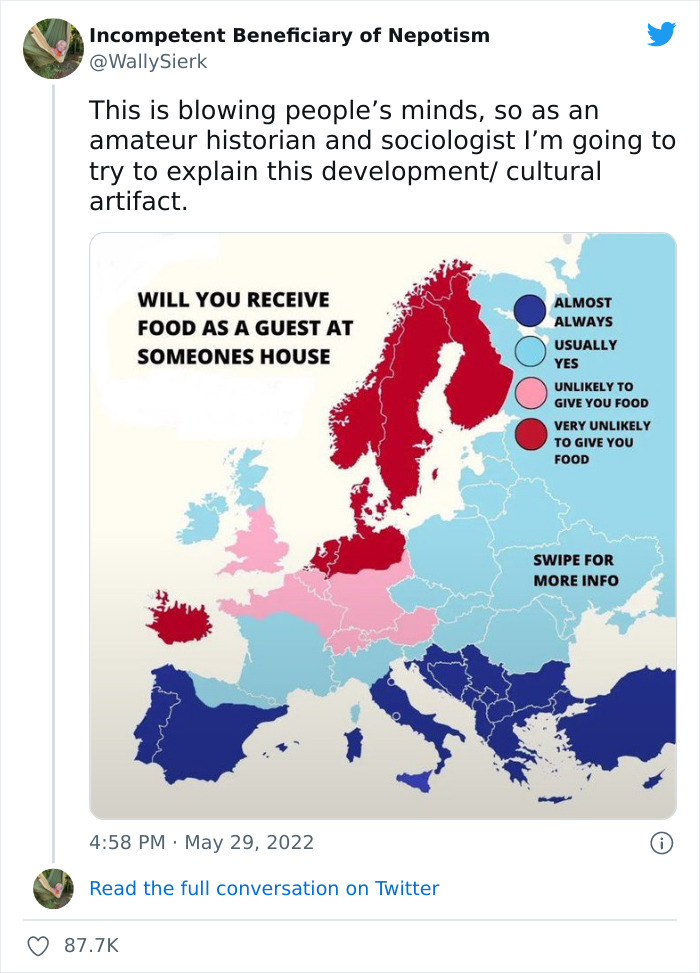


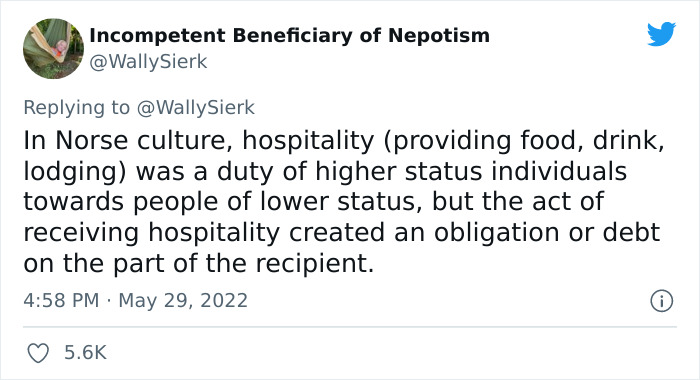
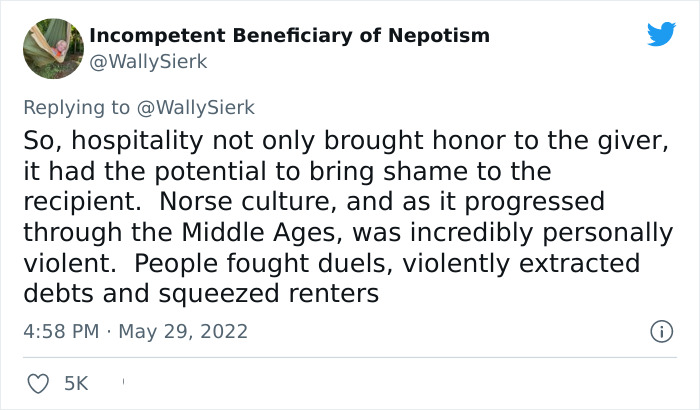




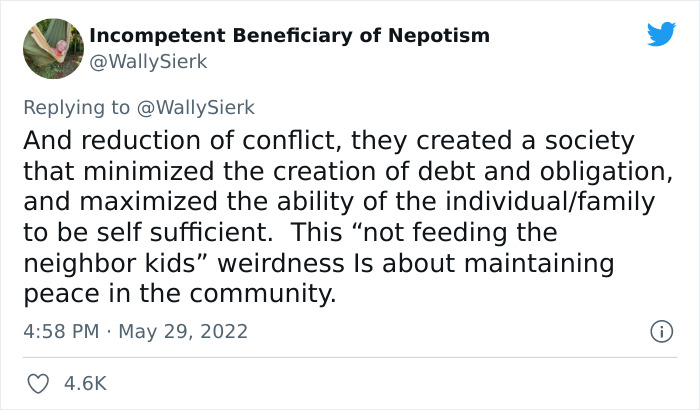


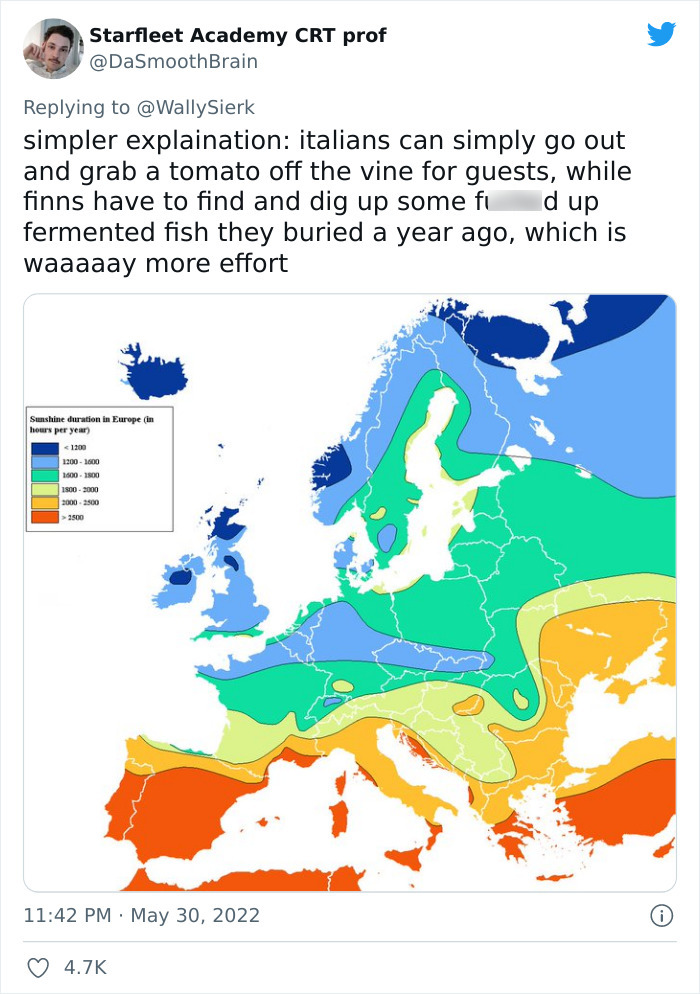
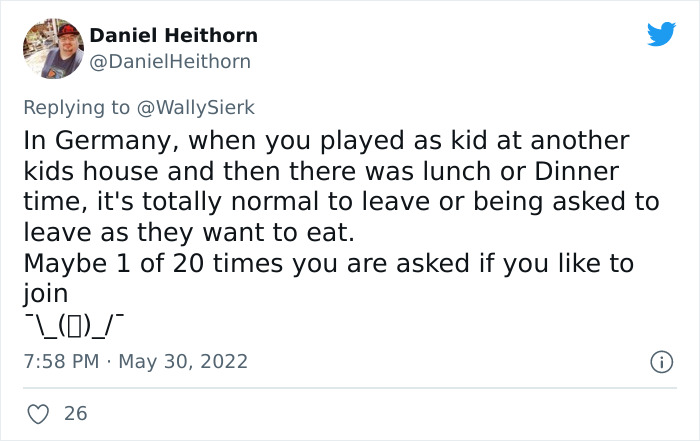

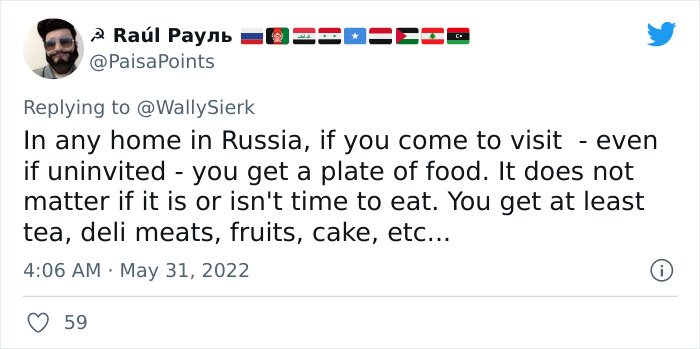
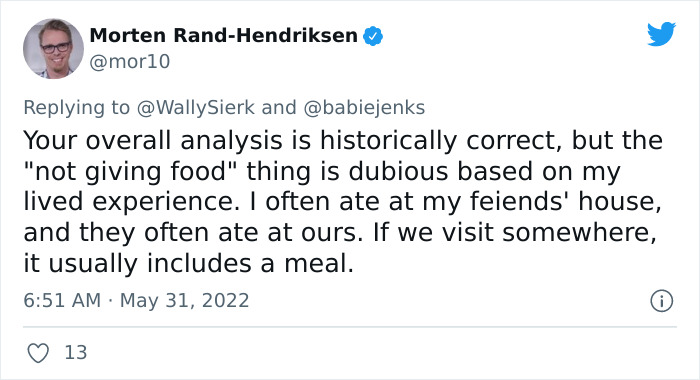
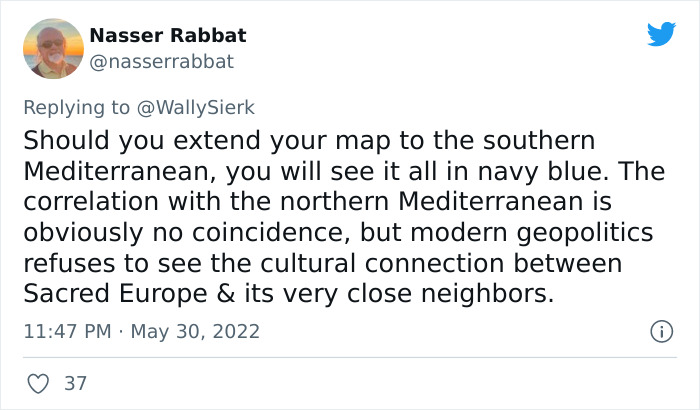


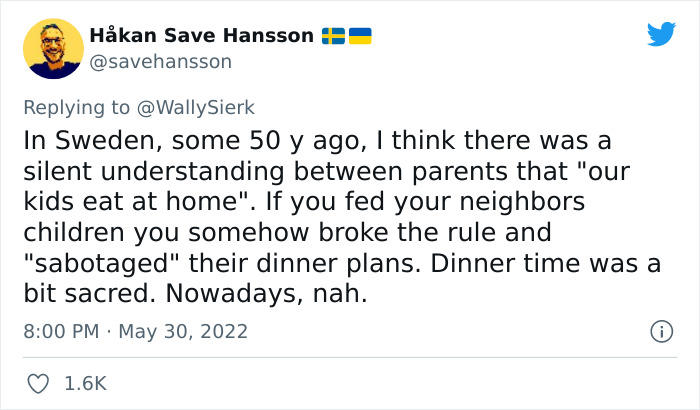


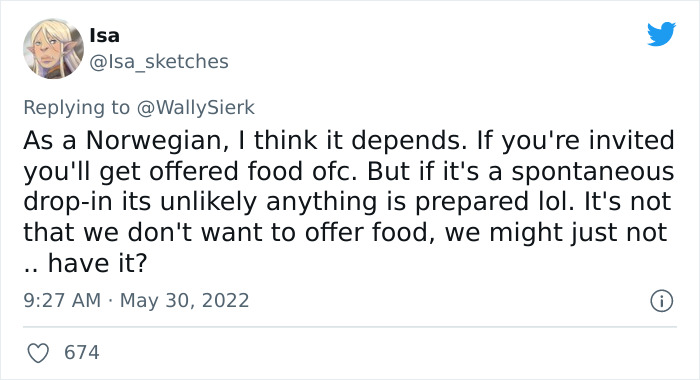






64
75